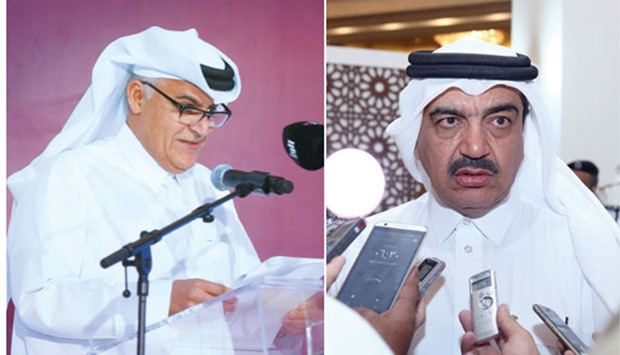Efforts undertaken to make Qatar’s roads safer saw “results exceed expectations” during the first half of Phase 1 of the National Traffic Safety Strategy, with the road accident fatality rate dropping to 7.5 per 100,000 people in 2015.
This was observed by a senior Ministry of Interior (MoI) official on the opening day of the two-day Qatar Transport Safety Forum 2016 in Doha yesterday.
The ministry is participating in the Qatar Transport Safety Forum, which was inaugurated yesterday by HE the Minister of Transport and Communications Jassim Seif Ahmed al-Sulaiti in the presence of HE the Minister of Municipality and Environment Mohamed bin Abdullah al-Rumaihi, HE Staff Maj Gen Saad bin Jassim al-Khulaifi, director-general of Public Security; Brig Mohamed Saad al-Kharji, director-general of the Traffic Directorate and vice-chairman of the National Traffic Safety Committee (NTSC); Brig Mohamed al-Malki, secretary of NTSC; Brig Mohamed Marafiya, director of the Traffic Engineering and Safety Department at the Traffic Directorate, and a number of officials and experts in the fields of transportation and traffic safety.
Brig al-Malki pointed out 92 of the 166 projects contained in the operational plan of the strategy were implemented by various stakeholders between 2013 and 2015. The remaining projects are to be completed by July 2017 while a portion has been shifted to the 2018-2022 plan, which will start six months ahead of schedule.
The official stressed that the safety initiatives undertaken by the NTSC and MoI have contributed to a significant reduction in the number of road traffic fatalities since the committee began its work. “While there were 13 to 14 deaths per 100,000 people at the start of the decade, now the number has fallen to 7.5 per 100,000,” said Brig al-Malki.
Speaking on the challenges ahead, he pointed to the need to reduce the number of traffic accident deaths from 227 in 2015 to 130 by 2022 and also lower the annual mortality rate to six per 100,000 people by 2022. This involves the implementation of the objectives of sustainable development, adoption of a demand management system in the field of transport, aimed at reducing traffic congestion, and developing cities and road & transport networks - thereby improving traffic safety, according to a statement from the MoI.
Further, the official said major changes have been under way since last year in the traffic sector. “Senior officials have been appointed to advise the stakeholders on different programmes of the MoI and reviews are conducted at regular intervals on the ministry’s initiatives,” he said.
He noted that the 10-year strategy, launched by HE the Prime Minister in January 2013, has been divided into two phases of five years each. A new National Traffic Safety Office has been opened to follow up on and support stakeholders in the state and the NTSC has also got membership of the United Nations (UN) road safety collaboration initiative.
Meanwhile, he observed – citing a report – that Qatar was in the 49th position globally and first in the Middle East in implementing the sustainable development goals of the UN.
Brig al-Malki said the country - a leader in traffic safety administration in the region - was committed to adopting various UN resolutions to provide a safe, secure and sustainable transport system, featuring an array of advanced technological solutions and travel options to meet the needs and requirements of its growing population. A comprehensive traffic safety programme and an action plan, aimed at providing safety and security to the population is currently under way in the country, it was observed.
Pedestrian safety
HE the Minister of Municipality and Environment Mohamed bin Abdullah al-Rumaihi yesterday said a number of projects would be implemented in the coming period to enhance pedestrian safety in crowded city areas as well as along highways. As many as 15 pedestrian bridges will be constructed in Doha and its suburbs as part of urban development plans to develop the city and its neighbourhood. This is being done in consultation with stakeholders such as the Public Works Authority (Ashghal) and the Ministry of Transport and Communications, he said.

Brigadier Mohamed al-Malki speaking at the opening session of the Qatar Transport Safety Forum 2016 in Doha yesterday. HE Mohamed bin Abdullah al-Rumaihi addressing the media. PICTURES: Jayan Orma
